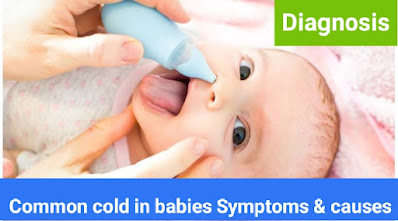Common cold in babies Symptoms & causes | Diagnosis & treatment
 |
| Common cold in babies Symptoms & causes | Diagnosis & treatment |
Diagnosis
Make sure to contact your baby's doctor as soon as possible if they are fewer than three months old. Making sure that a more serious sickness isn't present in infants is very critical, especially if your baby is feverish.
Generally speaking, if your older child has a typical cold, you don't need to visit the doctor. It may be appropriate to visit the doctor if you have any concerns or if your baby's symptoms get worse or stay the same.
A common cold may usually be diagnosed by your baby's doctor based on their signs and symptoms. Your doctor may request a chest X-ray or other tests to rule out other conditions if they think your child has a bacterial infection or another ailment.
Treatment
The common cold has no known remedy. A cough can last for a week or longer, although the majority of common cold cases resolve on their own without medical intervention in a span of seven to ten days. Cold viruses are immune to antibiotics.
Make sure your kid is getting enough water, suction nasal mucus, and keep the air moist as ways to try to make him or her more comfortable.
It is typically advised to avoid giving over-the-counter (OTC) drugs to babies.
Fever-reducing medications
Drugs that lower fever
If your child is uncomfortable with a fever, you can give them over-the-counter (OTC) drugs to lower the temperature. These drugs, however, do not eradicate the cold virus. It may be beneficial to let your child have a low-grade fever as this is a normal reaction to the infection.
Consider giving your child over-the-counter fever and pain relievers like ibuprofen (Advil, Motrin, etc.) or acetaminophen (Tylenol, etc.) to alleviate their fever or discomfort. These substitutes for aspirin are safer.
Don't administer paracetamol to babies under three months of age until after they've seen a doctor. Ibuprofen should not be given to children under six months old, to children who are dehydrated, or to children who are vomiting often. Take these drugs as soon as possible. If you give your kid medication, make sure you closely adhere to the dosage instructions. If you're unsure about the recommended dosage for your child, give your doctor a call.
Aspirin should never be given to kids or teenagers undergoing treatment for chickenpox or flu-like symptoms. This is due to the fact that aspirin has been connected to Reye's syndrome in these kids, a rare but possibly fatal illness.
Medication for colds and cough
Infants and small children should not use drugs for cough and colds. Over-the-counter cough and cold remedies can harm your child in addition to not treating the underlying cause of a child's cold or making it go away faster. Medication for colds and cough can have major adverse effects, which can be fatal if taken by children under the age of two.
With the exception of fever reducers and pain relievers, children under the age of six should not have coughs or colds treated with over-the-counter medications. Additionally, think about not giving these medications to kids under the age of twelve.
Comments
Post a Comment